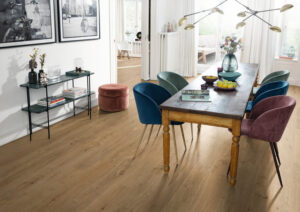When it comes to flooring, comfort is key. We all want a surface that feels good under our feet and enhances our overall well-being.
But with so many options available, how do we know which flooring is the most comfortable? In this article, we explore the different materials and their unique benefits.
From plush carpets to durable hardwoods, from versatile vinyl to natural cork, we delve into the world of flooring to help you make an informed decision for your home.
Key Takeaways Which Flooring Is Most Comfortable
- Comfort is crucial for enhancing productivity and reducing fatigue.
- Different flooring materials have unique benefits and drawbacks.
- Carpeting offers a soft and cozy feel underfoot, absorbs sound, and provides insulation.
- Hardwood floors add elegance, don’t trap dust or allergens, and provide a solid and stable surface.
The Importance of Comfort in Flooring
Comfort is a crucial factor when choosing flooring for your home. Understanding ergonomic design and the impact it has on our well-being is essential in creating a comfortable space. Whether it’s in residential or commercial settings, comfort plays a significant role in enhancing productivity, reducing fatigue, and promoting overall satisfaction.

In commercial spaces, such as offices or retail stores, providing a comfortable environment for employees and customers is vital. Ergonomic flooring designs can help alleviate physical discomfort caused by prolonged standing or walking. By incorporating cushioned materials or anti-fatigue features into the flooring, individuals can experience reduced strain on their joints and muscles.
Transitioning to the subsequent section about understanding different flooring materials, it’s important to consider how each material contributes to comfort and ergonomic support.
Understanding Different Flooring Materials
Laminate flooring is a popular choice due to its durability and affordability. When considering different flooring options, there are several factors to consider.

- Material: Each type of flooring material has its own benefits and drawbacks. Hardwood provides a timeless aesthetic, while vinyl offers water resistance and easy maintenance. Carpeting can add warmth and comfort to a room, while tile provides durability in high-traffic areas.
- Installation: Some flooring options require professional installation, while others can be easily installed as a DIY project. Laminate flooring, for example, often features a click-and-lock system that makes it simple for homeowners to install themselves.
- Maintenance: Different types of flooring have varying maintenance requirements. Hardwood floors may need periodic refinishing, while carpeting requires regular vacuuming and occasional deep cleaning.
Considering these factors will help you choose the right flooring option for your needs, ensuring both comfort and functionality in your space.
Exploring Carpet as a Comfortable Flooring Option
Carpeting is a great choice for those seeking a soft and cozy flooring option. Not only does carpet provide warmth and comfort underfoot, but it also offers numerous benefits for homeowners.

One of the main advantages of carpet is its ability to absorb sound, making it an excellent choice for reducing noise levels in any room. Additionally, carpet provides insulation, helping to keep rooms warmer during colder months while also acting as a natural air filter by trapping allergens and dust particles.
To maintain your carpet’s comfort and prolong its lifespan, regular vacuuming is essential to remove dirt and debris. Spills should be promptly cleaned with a mild detergent or specialized carpet cleaner to prevent stains from setting in.
As we transition into discussing the benefits of hardwood floors for comfort, it’s important to consider how different flooring options can impact our overall living experience.
Benefits of Hardwood Floors for Comfort
As you consider the benefits of hardwood floors, it’s important to note that they can add a touch of elegance and sophistication to any room in your home. But beyond aesthetics, hardwood floors also offer several advantages when it comes to comfort and maintenance.

Hardwood floors are easier to clean compared to carpets. They don’t trap dust, pet dander, or allergens like carpets do, making them a healthier option for those with allergies or respiratory issues.
Unlike carpets, hardwood floors don’t hold onto odors or stains. Spills are easily wiped away without leaving any lingering marks or smells.
Hardwood floors provide a solid and stable surface that feels firm underfoot. This makes walking and standing on them more comfortable than the soft cushioning of carpet.
Overall, choosing hardwood over carpet can enhance both the comfort and cleanliness of your space while adding a timeless beauty that will last for years to come.
Comfort and Durability: The Advantages of Vinyl Flooring
When it comes to comfort and durability, vinyl flooring offers several advantages.
Firstly, its soft underfoot feel provides a cushioned surface that is pleasant to walk on, making it ideal for areas where you spend a lot of time standing or walking.
Secondly, vinyl flooring is highly resistant to wear, meaning it can withstand heavy foot traffic without showing signs of damage or deterioration.
Lastly, one of the key benefits of vinyl flooring is its ability to cushion impact noise, making it an excellent choice for homes with kids or pets who tend to create a lot of noise when running around.
Soft Underfoot Feel
If you want a soft and comfortable feel under your feet, go for flooring options like cork or vinyl. These materials provide cushioned support and are perfect for creating a cozy atmosphere in your home.
Here’s why cork and vinyl flooring are great choices for those seeking a plush underfoot experience:
- Cork: Known for its natural elasticity, cork flooring offers excellent shock absorption and cushioning properties. It provides a soft, springy feel that is gentle on your joints, making it ideal for areas where you stand for long periods.
- Vinyl: With advancements in technology, vinyl flooring has evolved to mimic the luxurious feel of plush carpet. Its resilient surface is designed to offer a comfortable walking experience while still being easy to clean and maintain.
Both cork and vinyl flooring options give you the best of both worlds – comfort and durability. And speaking of durability, these materials are also resistant to wear…
Transitioning into the subsequent section about ‘resistant to wear’, let’s explore how these flooring options can withstand daily use without compromising their comfort factor.
Resistant to Wear
To ensure your flooring withstands daily use without sacrificing its comfort, consider opting for materials like cork or vinyl.
These options are not only comfortable underfoot but also highly resistant to wear.
Cork is a natural material that offers excellent durability due to its cellular structure, making it highly resilient against impact and compression. It can handle heavy foot traffic without showing signs of wear, maintaining its softness and cushioning over time.
Vinyl flooring, on the other hand, is known for its exceptional durability and resistance to wear and tear. It is constructed with multiple layers that provide strength and stability, ensuring it can withstand the demands of everyday life without losing its comfortable feel.
Cushions Impact Noise
Cork and vinyl flooring are great options for homeowners because they cushion impact noise, making the space more peaceful. When it comes to reducing impact noise, these types of flooring really shine.
Here are a few benefits of underlayment that contribute to their effectiveness:
- Sound insulation: Underlayment adds an extra layer of soundproofing, absorbing and dampening the noise caused by footsteps or falling objects.
- Comfort: The softness and flexibility of cork and vinyl provide a comfortable surface to walk on, reducing strain on joints and muscles.
- Thermal insulation: Underlayment also helps with temperature regulation, keeping your feet warm during cold winters and cool during hot summers.
With these advantages in mind, it’s clear why cork flooring is such a natural and comfortable choice for any home. Let’s dive deeper into its unique properties.
Cork Flooring: A Natural and Comfortable Choice
Cork flooring offers a warm and cushioned surface for ultimate comfort. It is not only comfortable to walk on, but it also has several other benefits that make it an excellent choice for your home.
Firstly, cork flooring is a natural and sustainable option. It is made from the bark of cork oak trees, which can be harvested without damaging the tree, making it an environmentally friendly choice.
Additionally, cork flooring is hypoallergenic, meaning that it does not trap dust or allergens like other types of flooring do. This makes it perfect for people with allergies or respiratory issues.
Lastly, cork flooring is easy to maintain. It is naturally resistant to moisture and mold growth, making cleaning a breeze.
Overall, cork flooring provides both comfort and practicality for any home.
Comfort and Style: Choosing Laminate Flooring
Laminate flooring offers a stylish and affordable option for homeowners. With its wide range of designs and textures, laminate can mimic the look of hardwood, tile, or even stone. When choosing the right laminate for your home, consider the following options:
- Thickness: Thicker laminates offer better sound insulation and durability.
- AC Rating: Look for a high AC rating to ensure your laminate is suitable for heavy foot traffic areas.
- Waterproofing: Some laminates have waterproof features, making them ideal for kitchens and bathrooms.
In addition to its aesthetic appeal, laminate flooring is also easy to maintain. It resists stains, scratches, and fading from sunlight. Furthermore, it’s a great choice if you have pets or children since it’s resistant to dents and spills.
Comfortable and Eco-Friendly: Bamboo Flooring
Bamboo flooring is a popular choice for homeowners looking for both comfort and eco-friendly options. Not only does it provide a warm and inviting atmosphere, but it is also incredibly durable and sustainable. Made from the fast-growing bamboo plant, this type of flooring is an excellent alternative to traditional hardwood floors.
One of the key benefits of eco-friendly bamboo flooring is its comfort level. The natural elasticity of bamboo makes it softer underfoot compared to other types of flooring materials. This cushioning effect provides a comfortable surface that absorbs impact and reduces strain on joints, making it ideal for households with children or elderly individuals.
In addition to being comfortable, bamboo flooring is also sustainable. Bamboo can be harvested without killing the plant, which allows for rapid regeneration and minimal impact on the environment. It is a renewable resource that takes significantly less time to grow back compared to hardwood trees.
Overall, eco-friendly bamboo flooring offers homeowners a comfortable and sustainable option for their homes. Its durability, warmth, and environmentally friendly properties make it an excellent choice for those seeking both comfort and style in their living spaces.
Frequently Asked Questions
Are There Any Flooring Materials That Offer Both Comfort and Durability?
There are flooring materials that offer both comfort and durability. When considering comfortable options for pets, factors like softness and slip resistance should be considered. Underfloor heating can also enhance comfort levels.
What Are the Potential Drawbacks of Carpet as a Comfortable Flooring Option?
Carpet has potential drawbacks as a comfortable flooring option. It may pose potential health risks due to allergens and difficulty in cleaning spills or stains.
Can Vinyl Flooring Be a Good Choice for High-Traffic Areas in Terms of Both Comfort and Durability?
Vinyl flooring can be a good choice for high-traffic areas due to its durability and comfort. It is resistant to wear and tear, making it suitable for heavy foot traffic while still providing a comfortable surface to walk on.
How Does Cork Flooring Compare to Other Materials in Terms of Comfort and Maintenance?
Cork flooring vs. hardwood – which is comfier and easier to maintain? Cork offers a softer surface than hardwood, providing more comfort underfoot. Plus, it’s low maintenance, requiring simple sweeping and occasional resealing.
Are There Any Specific Factors to Consider When Choosing Laminate Flooring for Maximum Comfort?
When choosing comfortable laminate flooring, key considerations include the thickness and underlayment. Additionally, enhancing comfort during installation can be achieved by adding a moisture barrier and using a good quality padding.
Conclusion
In conclusion, when it comes to choosing the most comfortable flooring for your home, there are several options to consider.
Carpet offers a luxurious and cozy feel underfoot, while hardwood floors provide both comfort and timeless beauty.
Vinyl flooring combines comfort with durability, making it an excellent choice for high-traffic areas.
Cork flooring offers natural warmth and cushioning, perfect for those seeking eco-friendly options.
Lastly, laminate and bamboo flooring offer a balance of comfort and style.
With these choices in mind, the suspense builds as we eagerly anticipate finding our perfect flooring match.




